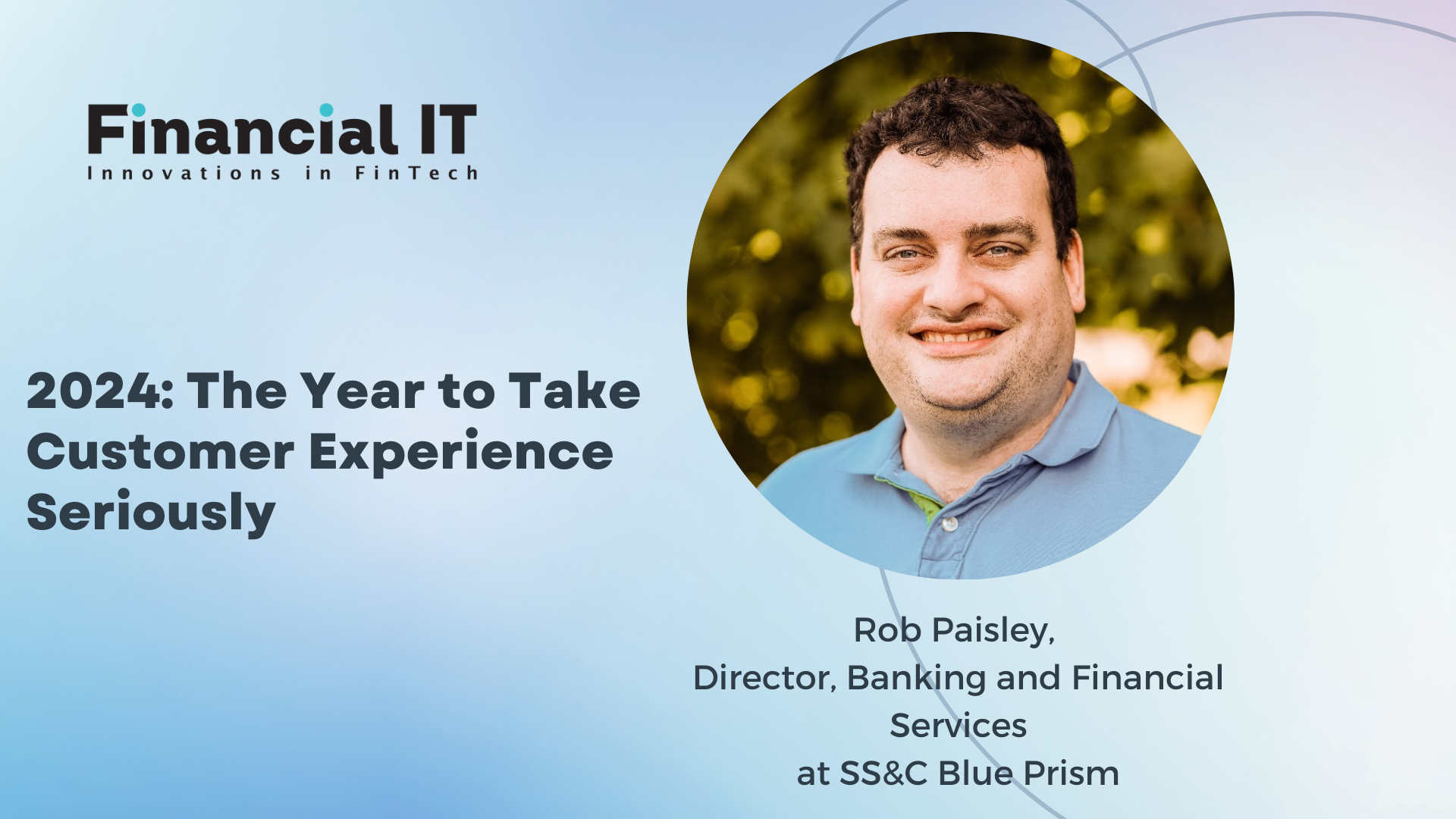2024: The Year to Take Customer Experience Seriously

- Rob Paisley, Director, Director, Banking and Financial Services at SS&C Blue Prism
- 24.05.2024 01:00 pm #CustomerExperience #2024Trends #banking #cash
When was the last time you told someone about the great service you received from your bank, insurance company or tax office? Whether it’s a car or house purchase, investment fund transfer, or simply renewing a bankcard, financial institutions aren’t the best when it comes to NPS scores.
In a world where online shopping takes three clicks, today’s banking customers find the journey cumbersome due to delays, errors, hidden fees, and fund-accessibility issues. They actually rank their streaming and parcel delivery service higher in terms of satisfaction. The TrueDigital Quotient stands at a mere 25%, reflecting the dissatisfaction customers feel when completing transactions solely through digital channels.
And, while big name banks and financial institutions are exploring how they can increase customer satisfaction, reduce operational costs, and drive revenue growth by using artificial intelligent (AI) technologies in future, wouldn’t investing in existing intelligent automation (IA) to manage digital tasks make more sense?
Neobanks and digital banks leverage intelligent automation for faster customer journeys. This includes ‘know your customer’ checks, digital onboarding, and seamless processes, catering to both digital and traditional customers effectively – meaning customers can get what they want quickly, and without pain. For younger customers this means digital banking, while traditional customers are provided with better service at a physical location that includes digital offerings.
In banking and finance, most companies think of RPA-IA as an efficiency tool, but significant opportunities often unexpectedly arise when they start to deploy it. Often, it’s the customer experience that benefits most as it’s not just about efficiency. Automation software can help re-imagine your offerings with the customer at the centre of it. Amidst the AI rush, revisiting foundational basics before proceeding may be prudent, as IA establishes essential groundwork often overlooked.
The banking customer blind spot
From routine tasks like mortgage applications to specialised services, such as closing accounts, infrequent or one-time customer experiences, significantly shape long-term loyalty and recommendations.
Let me paint you a picture with a tangible example of why people might take their business elsewhere, to illustrate how today’s predominantly young customers are not brand-loyal, and seek the easiest route to fulfil their needs swiftly.
If you join a cloud-based digital bank that has no branches, all transactions will likely be delivered by a 24/7 customer support hotline. Certain banks like this also don't do checking accounts, only high yield savings CDs and loans which many people are attracted to given preferrable interest rate offers. This all sounds great, but you still run into the infancy of some of these technologies.
To do a mobile cheque deposit, we’ve had clients say it might take 14 days to clear. That’s not good enough. Even two days isn’t good enough given the technology available for these processes. It may also require the customer to write a restrictive endorsement on the back of the check saying it can only be deposited at the specific bank. Once the endorsement is written, it can’t be taken anywhere else other than that bank. If they reject it, they don't have branches, so customers can't walk in and talk to a human being and talk to someone.
Anything that improves time to resolution in a self-service fashion on a digital channel helps, but in reality, it's a dichotomy. How can you have a cashless society until you solve basic issues like that one? It's a pain to transfer out and you don't really want to, but lethargy is inherently baked into the system so anything that can speed up the process is going to improve the customer experience.
Dissatisfaction often goes unvoiced, with customers silently departing without notice. Many companies remain unaware until weeks later, indicating a blind spot in recognising and addressing evolving customer behaviour.
With so much money at stake why are organisations struggling to get it right? This year, customer experience takes centre stage, with forward-thinking companies investing in process intelligence, business orchestration and automation. Those lagging lack measurement tools and awareness of their shortcomings. Banks excelling in this realm employ more than 500 digital workers and meticulously measure outcomes, while others trail behind with fewer than 10 or none at all.
When cash is no longer king
Northern Europe boasts the largest global digital banking market, with Sweden dominating with a 98% cashless economy. Nordea, a leading bank in the region, spearheads this transformation by prioritising customer-centricity around the concept of ‘the idea of something better’ through cutting-edge mobile and digital banking solutions. Despite its 200-year legacy, Nordea embraced online banking early on, and in 2015, it adopted banking automation software to revolutionise its operations. Some six million transactions are processed by its digital workforce, including simple tasks such as new card requests, reducing errors and costs, allowing Nordea to tailor its services based on customer preferences.
“It’s one of the key aspects where we want to be the leading bank. We have invested a lot into our mobile bank, which is regarded as the best in the Nordic markets,” says Ossi Leikola, Head of Operations at Nordea. “We also believe very much in a personal relationship with our customers – that’s why we’re very interested in omni-channel.”
Nordea now employs nearly 400 digital workers and 450 automated processes for its 10 million customers worldwide. This transformation has elevated customer satisfaction, positioning the bank as a regional leader, using SS&C Blue Prism intelligent automation.
When it comes to customer experience, efficiency is key to retaining loyalty. Companies excelling in speedy, accurate interactions keep their customers. Automation tools simplify transactions, ensuring customer satisfaction and loyalty. In today’s informed market, banks must capitalise on engagements or risk reputational damage.





















